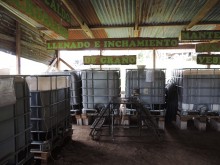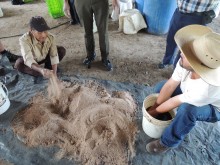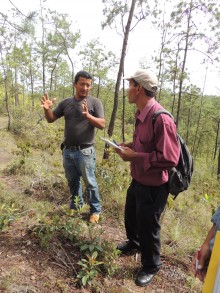COOPERATION IN PRODUCTIVITY
Marcala, Honduras
In Part 1, I explained the groundwork philosophy that the members of COMSA (Honduras) shared with the members of Las Colinas (El Salvador). Now let's get a little nerdy and dig into the more practical, technical side of what COMSA shared and how it has contributed to their success.

The members of COMSA developed a set of guidelines they call “the five M's of organic agriculture,” which are a distillation of the farmers’ work and experimentation over the last 13 years.
- Organic material is, of course, the first building block of organic agriculture – manure, decomposing leaves, coffee pulp, organic household waste, etc. Rather than disposing of this leftover matter, farmers at COMSA collect it and use it on their farms. But they have realized that using organic material alone does not mean they will get the full benefits of its nutrients and power. In order to do that, a little something more is needed.
- Microorganisms are key to maximizing organic material by converting it into rich matter like humus, which plants can use more effectively than undecomposed manure, for example. The Las Colinas members learned how to cultivate these important microorganisms from their own forests and then use them to make high-impact organic fertilizers on their farms.

- Minerals refer to all of the different rock meals and sands that plants need. At COMSA, farmers collect rocks of different origins and colors and then pulverize them, using the meal to create mineral rich biofertilizers. The Las Colinas guys learned the methodology of COMSA’s homegrown “Mineral Soup,” and were excited about unlocking existing natural resources at home – especially with the abundant minerals in the volcanic landscape of El Salvador.
- Living molecules refer to proteins, hormones, vitamins, enzymes and microflora – and if you mix together the first three M’s in this series, this is what you get. It represents another practical and philosophical lesson: like the many components that combine to make effective living molecules, ideas and techniques should similarly be applied together in order to yield a greater impact.

- Gray matter represents what every individual is able to bring to their farm: the unique ability to invent and discover creative solutions to the challenges that they face. I think it is really invaluable for the Las Colinas farmers to hear this from their Honduran neighbors – that their own minds are a fundamental piece of organic agriculture. We do not spend enough time valuing the work of farmers, let alone valuing their minds and creative abilities. However, the farmers of COMSA make it clear that the mind is an absolutely necessary part of the equation. Without observation, analysis, invention and experimentation in the practical application of organic agriculture, we will not get anywhere.
In Marcala, we learned that the philosophical cannot be removed from the practical. Honestly, that is what was so amazing to witness: the Las Colinas farmer soaking up the mindset that permeates all of these new techniques and practices. They returned to El Salvador armed not just with recipes for compost and fertilizers and mineral soups, but with the mental framework to create their own new techniques.
Up Next: Final thoughts from our first Cooperation in Productivity event in Honduras.
